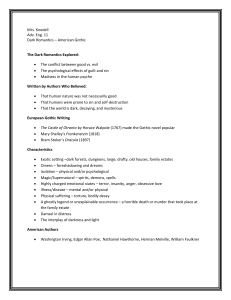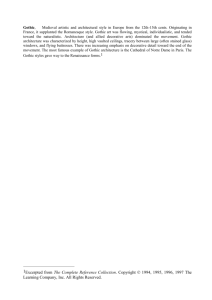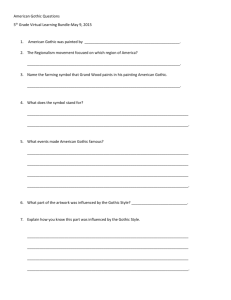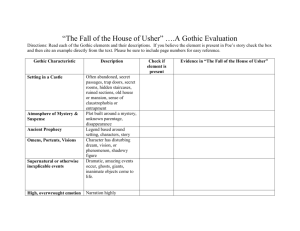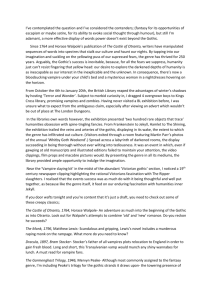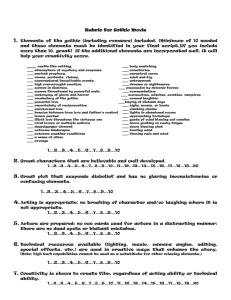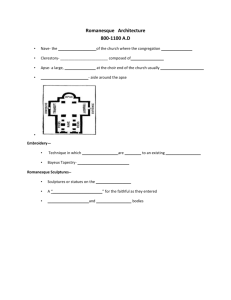Abstract 1 "Gothic Fiction - The Art and Popular Culture
advertisement
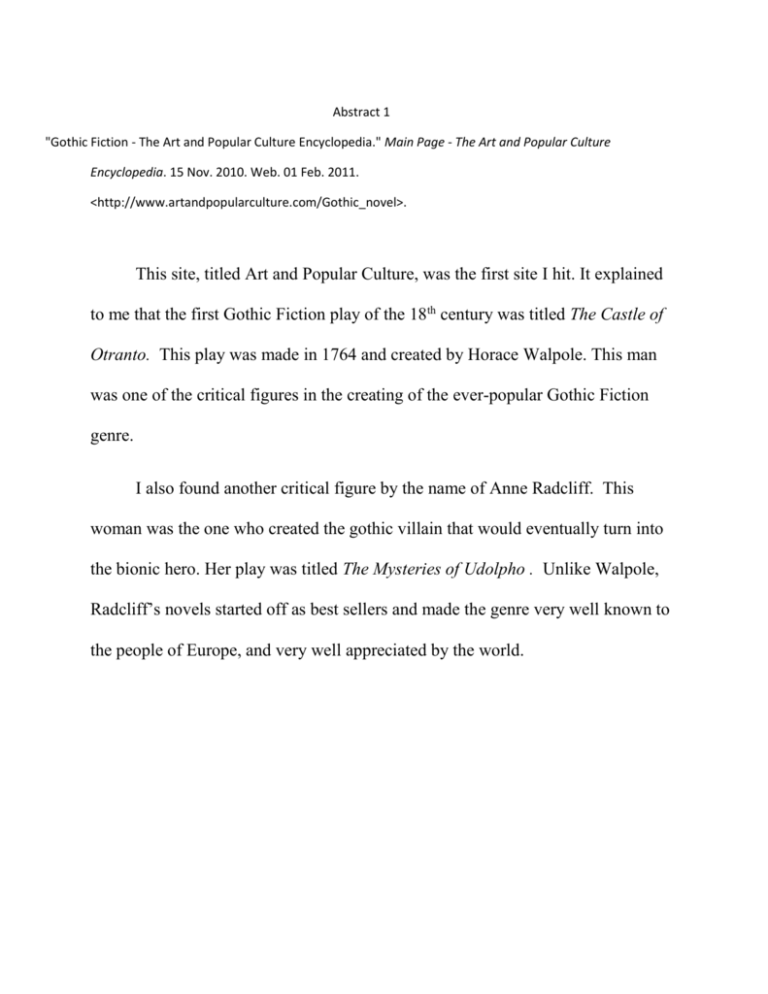
Abstract 1 "Gothic Fiction - The Art and Popular Culture Encyclopedia." Main Page - The Art and Popular Culture Encyclopedia. 15 Nov. 2010. Web. 01 Feb. 2011. <http://www.artandpopularculture.com/Gothic_novel>. This site, titled Art and Popular Culture, was the first site I hit. It explained to me that the first Gothic Fiction play of the 18th century was titled The Castle of Otranto. This play was made in 1764 and created by Horace Walpole. This man was one of the critical figures in the creating of the ever-popular Gothic Fiction genre. I also found another critical figure by the name of Anne Radcliff. This woman was the one who created the gothic villain that would eventually turn into the bionic hero. Her play was titled The Mysteries of Udolpho . Unlike Walpole, Radcliff’s novels started off as best sellers and made the genre very well known to the people of Europe, and very well appreciated by the world. Abstract 2 "GOTHIC GENRE." Web. 01 Feb. 2011. <http://shs.westport.k12.ct.us/palca/romantic_and_gothic_genre.htm>. In this site, titled Gothic Genre, I discovered the elements that make up the Gothic Fiction genre. These elements include: the grotesque elements, the mysterious, the desolate environment, the horrible, the supernatural, and the fear that can be created in the reader. Another thing I found was the difference between the Gothic Fiction genre and the Romanticism genre. Yes, Gothic fiction is a branch off of Romanticism. However, the main elements include: spontaneity, expression, idealization of nature, and an age of “new beginnings.” The Romantic movement lasted into the 19 th century and released a whole new side of creativity to the literature world. Abstract 3 "Gothic: Information from Answers.com." Answers.com: Wiki Q&A Combined with Free Online Dictionary, Thesaurus, and Encyclopedias. Web. 01 Feb. 2011. <http://www.answers.com/topic/gothic-8>. From this site, I learned how the Gothic Fiction genre came immediately after post-enlightenment. This time period had called into question society's “conventional wisdom.” The point Gothic Fiction authors were trying to make was to develop a set of conventions. They were to expand the creativity depths of the mind, to make the reader lose himself or herself in the creativity. To differ from most stories written in the enlightenment period, most stories were written based around a castle, or medieval times. Another trait that differed in this genre was being based in the darkness, or during stormy weather. These authors made the characters follow a timeless social order; however, most stories included monsters, ghosts or some form of human servant to Satan. Abstract 4 Michaud, Marilyn. "Gothic Fiction – An Introduction: The Origins of Terror Writing." Suite101.com: Online Magazine and Writers' Network. 18 June 2009. Web. 01 Feb. 2011. <http://www.suite101.com/content/gothic-fiction-an-introduction-a125620>. Reading this sight gave me the meaning of the word “Gothic”. The word first appeared in the 17th century in reference to the Germans. As time passed it came to be known as medieval, unenlightened and superstitious. Towards the beginning of the 17th century, this term had also earned the title as “irrational” and “backwards,” for good reason. However, towards the middle of the 17th century, interests of the people shifted to the medieval architecture and ancient romance culture. Thus resulting in Walpole’s publishing of what came to be known as the Gothic Fiction genre’s first story, The Castle of Otranto. Walpole had apparently already successfully built his own castle that had combined the two types of romances, ancient and modern. Along with encouraging the genre, he brought out some other famous authors of this time period: Mathew Lewis (The Monk, 1796), Anne Radcliffe (The Italian, 1797), Samuel Taylor Coleridge ("Christabel", 1816), John Keats ("Eve of St Agnes", 1820), and John Polidori (The Vampyre, 1819), and Mary Shelley (Frankenstein,1831) Abstract 5 "Gothic Novel - Definition." Dictionary, Encyclopedia and Thesaurus - WordIQ Dictionary. Web. 01 Feb. 2011. <http://www.wordiq.com/definition/Gothic_novel>. The term “Gothic” means ugly, or barbaric. Renaissance authors of this time that idolized the practice of writing about the combined the classical period’s architecture, and ideas of the middle ages, scornfully became known as Gothic. Before the Gothic Fiction period took place, was the neoclassical time period. Stories were filled with purity and reason and obviously became boring to the many readers and attendee’s of the local plays. Therefore, when the Gothic ideas came into practice, people fell in love with the extreme emotion. In these Gothic plots and stories, the inevitable decay and collapse of human creation came into play. This created the craze for building fake ruined churches all over the European country estates. It also led many to join the anti-Catholicism practice, first started by the Reformation. Abstract 6 "Gothic Novel - Definition." Dictionary, Encyclopedia and Thesaurus - WordIQ Dictionary. Web. 01 Feb. 2011. <http://www.wordiq.com/definition/Gothic_novel>. From this article I learned how the word, “gothic” meant barbaric and ugly. Most renaissance writers who idolized the classical genre scornfully began calling the new time period gothic, and described it as the “legacy of the barbarian invasion of Rome.” The writers disliked the turn of the people’s interest, which went from sensible and classical to morphed and torturous. The Gothic genre lasted well into the Victorian age and left quite a legacy. Buildings all across the country side saw, and will continue to always see, the Gothic architecture. As well as impacting the architecture, it also created short ghost stories in the Victorian age, which became widely popular and entertaining. One of the more popular author of this period was Edgar Allen Poe, as well as Charles Dickens. Both of whom read Gothic fiction as a teenager and incorporated the gloomy atmosphere in both of their most famous pieces. Abstract 7 Graham, Wendy C. "Gothic Elements and Religion in ..." Google Books. 1999. Web. 02 Feb. 2011. <http://books.google.com/books?id=_37fWLFedgsC&pg=PA34&lpg=PA34&dq=religious elements of gothic fiction&source=bl&ots=-GwWdVS630&sig=kiaOlpgkHshIQpZEmYR8KyrVEY&hl=en&ei=yExJTeCRBMLbgQflnqncDw&sa=X&oi=book_result&ct=result&resnum=2&ved=0CB4Q6AE wAQ#v=onepage&q=religious elements of gothic fiction&f=false>. In this online book I learned the about the people of the time period. They were entertained by plays and books, mostly. The Gothic genre captured the interest of every mind. It captured their interest because after seeing the same classical architecture, the same classical plays and reading the same classical literature, they wanted something new. Horace Walpole gave the people what they wanted and created a twisted view on the world. Instead of seeing sunshine and smiles, he saw thunderstorms and torture. He saw monsters and vampires. He made up legends that to this day are still recited. Horace Walpole influenced the people’s way of seeing everything, and in many ways broadened their horizons and opened up their minds to things that previous famous authors had yet to do. Abstract 8 Heiland, Donna. "Gothic and the Generation of Ideas1 : Literature Compass." Home. Dec. 2006. Web. 01 Feb. 2011. <http://www.blackwellcompass.com/subject/literature/article_view?article_id=lico_articles_bpl414>. In this site, Marshall Brown wrote an article talking about how legendary the gothic genre is. He describes it by saying, “significance lies in what it enabled its future readers to see, in what arguments it provoked, and. . . In what dreams it stimulated.” I also learned from this article that the Gothic genre resurfaced in the 1970’s with the feminist movement because of the way the movement fails to identity race, class or gender. The article also describes on how much deeper we are now able to understand the Gothic genre. So the question arises, have we learned all that’s been learned? Or do we still have to search deeper for secret meanings, or metaphors that we have never been able to catch? Abstract 9 Lambert, Tim. "Life In The 18th Century." A World History Encyclopedia. 2009. Web. 01 Feb. 2011. <http://www.localhistories.org/18thcent.html>. In this article, I learned a little bit more about the people of the 18th century. I learned more forms of entertainment for them. In the gothic movement, for leisure they took trips to the spa. However that was for the more wealthy people, the less fortunate people spent their time elsewhere. The attended puppet shows, cock fighting, and public executions. The public executions drew in large crowds and entertained many. In my opinion, this sick twisted part of their minds yearned for more sick entertainment. Mich like the large, public executions. That is where the Gothic genre comes into play. The gothic movement is similar to an outlet for the people of the 18th century to express their dark side, or for a more proper word, “evil.” Abstract 10 Michaud, Marilyn. "Gothic Fiction – An Introduction: The Origins of Terror Writing." Suite101.com: Online Magazine and Writers' Network. 18 June 2009. Web. 01 Feb. 2011. <http://www.suite101.com/content/gothic-fiction-an-introduction-a125620>. In this article, it discussed how key Horace Walpole was to the gothic genre. Toward the middle of the 18th centure, the people began a gothic revival. And who better to head way this revival than Walpole himself? Having already built his own gothic castles, he easily influenced the new architecture as well. Without Strawberry Hill, his person castle, than the rest of the country would not have been able to see the mixture of acient romantic cultures coming together. Anne Radcliffe was another famous gothic romance novelist. Whereas Walpole introduced the new genre and architecture, Radclifffe introduced the difference between horror and terror. Radcliffe states that terror "expands the soul, and awakens the faculties to a high degree of life." She then explains that horror "contracts, freezes, and nearly annihilates them". In other words, terror is pleasurable because it is cloaked in obscurity and mystery while horror is graphic curious.
